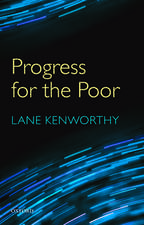Welfare, Incentives, and Taxation
Autor James Mirrleesen Limba Engleză Hardback – 16 mar 2006
Preț: 1002.13 lei
Preț vechi: 1515.13 lei
-34% Nou
Puncte Express: 1503
Preț estimativ în valută:
191.76€ • 199.82$ • 158.77£
191.76€ • 199.82$ • 158.77£
Carte tipărită la comandă
Livrare economică 24-29 martie
Preluare comenzi: 021 569.72.76
Specificații
ISBN-13: 9780198295211
ISBN-10: 0198295219
Pagini: 584
Ilustrații: Numerous figures and tables
Dimensiuni: 164 x 242 x 37 mm
Greutate: 1.03 kg
Editura: OUP OXFORD
Colecția OUP Oxford
Locul publicării:Oxford, United Kingdom
ISBN-10: 0198295219
Pagini: 584
Ilustrații: Numerous figures and tables
Dimensiuni: 164 x 242 x 37 mm
Greutate: 1.03 kg
Editura: OUP OXFORD
Colecția OUP Oxford
Locul publicării:Oxford, United Kingdom
Recenzii
James Mirrlees' special gift is to bring new perspectives to the understanding of major economic issues, economic growth and the choice of taxes. The importance of asymmetric information in the optimality of taxes was one of his greatest contributions, the study of different aspects of the role of increasing returns in economic growth another. Drawing these contributions, scattered over many journals, into a single volume will remind of the power of Mirrlees's analysis and make reference that much easier.
Not only does this book belong on the shelves of every economist, also the contents of the papers belong in the undersatnding of every economist.
Not only does this book belong on the shelves of every economist, also the contents of the papers belong in the undersatnding of every economist.
Notă biografică
James A. Mirrlees is Professor of Political Economy at the University of Cambridge and Fellow of Trinity College. He was previously Edgeworth Professor of Economics at the University of Oxford (1968-95). In 1996 he won the Nobel Prize for Economics for fundamental contributions to the economic theory of incentives under asymmetric information. His research interests are optimal income taxation; policy implications of imperfect rationality; and principal/agent situations with multidimensional choice variables.










